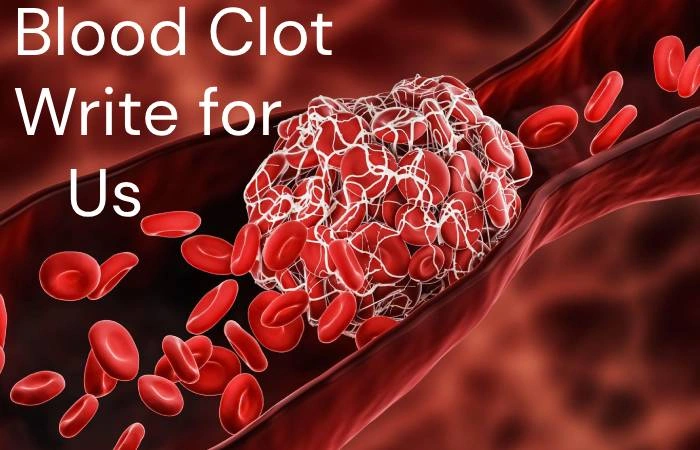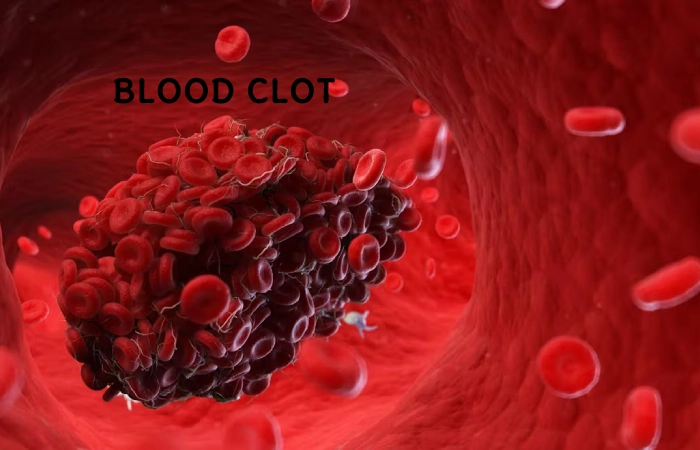Blood Clot Write for Us

A blood clot is a solid form of blood that develops when blood platelets clump together. Blood clots are necessary to stop bleeding, but they can also be dangerous if they develop in the wrong place, such as in a blood vessel that transfers blood to the heart or brain. If you want to write interesting articles we are here to publish your thoughts at contact@smarthealthweb.com
Blood clots form when there is a disruption in the blood’s normal flow. It can happen due to injury, surgery, or certain medical conditions, such as:
- Injury: When a blood vessel is hurt, platelets are activated and clump together to form a clot. This clot helps to stop the bleeding.
- Surgery: Surgery can also disrupt the blood’s flow, leading to blood clots.
- Medical conditions: Certain conditions, such as heart disease, stroke, and cancer, can raise the risk of blood clots.
Blood Clots Can be of Two Main Types:
- Venous blood clots: Venous blood clots form in veins, usually in the legs. They are the most common type of blood clot.
- Arterial blood clots: These clots form in arteries, which carry blood away from the heart. They are less common than venous blood clots but more dangerous because they can block blood flow to vital organs.
Blood clots can lead to various symptoms, depending on where they form. Venous blood clots can cause pain, swelling, and redness in the affected area. Arterial blood clots can cause chest pain, shortness of breath, and stroke.
If you think you have a blood clot, you should see a doctor immediately. Blood clots can remain treated with medication or surgery.

Here are Some Ways to Help Prevent Blood Clots:
- Stay active: Exercise helps to keep the blood flowing smoothly.
- Avoid smoking: Smoking harms the blood vessels and increases the risk of blood clots.
- Maintain a healthy weight: Overweight is a risk factor for blood clots.
- Take medications as prescribed: If you take medicines that increase the risk of blood clots, such as birth control pills, take them as prescribed.
- Get regular checkups: Your doctor can monitor you for risk factors for blood clots and recommend preventive measures.
How to Submit Your Articles on Smarthealthweb?
To write to us you can email us at contact@smarthealthweb.com
Why Write for Smarthealthweb – Blood Clot Write for Us

Writing for smarthealthweb can expose your website to customers looking for Blood Clot
Smarthealthweb presence is on Social media, and also we will share your article with the Blood Clot-related audience.
You can reach out to Blood Clot
Search Terms Related to Blood Clot Write for Us
- Thrombus(sponge)
- Embolism
- Thrombosis
- Coagulation
- Hemostasis
- Fibrin
- Injury
- Blood vessel
- Circulatory system
- Microcirculation
- Capillary
- Pulmonary alveolus
- Lung
- Respiratory system
- Red blood cell
- Platelet
- Heart
- Aorta
- Aortic arch
- Artery
- Descending aorta
Search Terms for Blood Clot Write for Us
Blood Clot Write for Us
Blood Clot Guest Post
Submit an article
Blood Clot Contribute
Guest Post Blood Clot
Blood Clot Submit Post
Blood Clot submit an article
Become a guest blogger for Blood Clot
Contribute Blood Clot
Blood Clot Submit post
Submit an article
Blood Clot become, a guest blogger
Blood Clot writers wanted
Submit an article
Blood Clot suggests a post
Contribute Blood Clot
Blood Clot guest author
Article Guidelines – Blood Clot Write for Us
- We at smarthealthweb welcome fresh and unique content related to Blood Clot
- Smarthealthweb allows a minimum of 500+ words associated with the Blood Clot
- The editorial team of smarthealthweb does not encourage promotional content related to Blood Clot
- For publishing an article at smarthealthweb, email us at contact@smarthealthweb.com
- Smarthealthweb allows articles related to beauty, fitness, health, wellness, diet, diseases & cure, etc.
Related Pages:
Weight Loss Programs Write For Us
Vitex Write For Us, Guest Post
